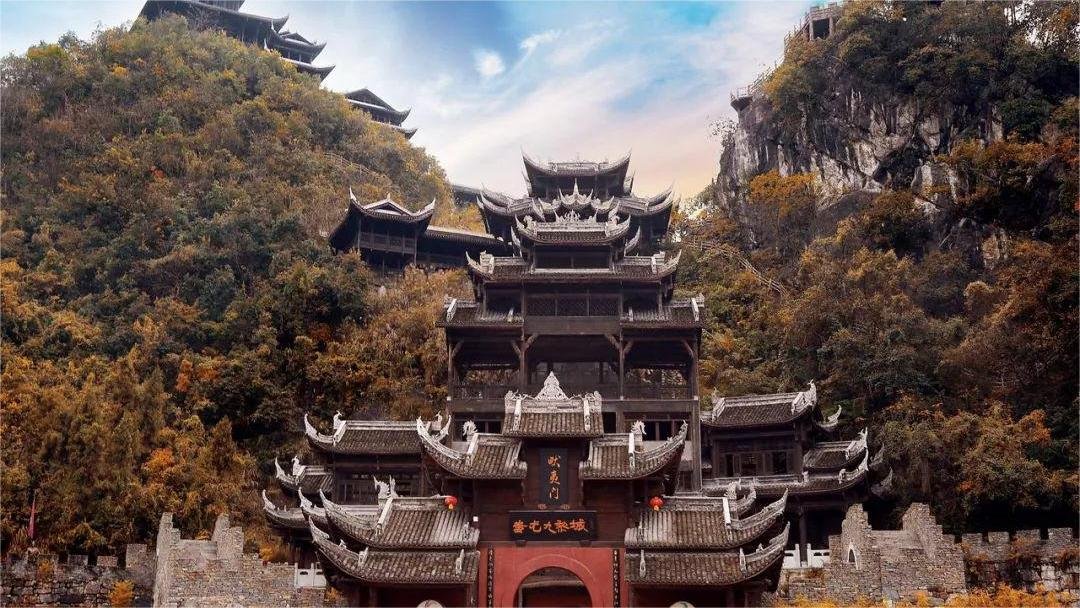Chiyou Jiuli City (蚩尤九黎城), located in Pengshui County, Chongqing, is a cultural gem that celebrates the rich heritage of the Miao ethnic group, with a focus on the legendary figure of Chiyou. This city serves as a vivid showcase of Miao culture, traditions, and architecture, immersing visitors in the unique charm of this ethnic group.
At the heart of Jiuli City, you will find an array of distinctive structures that highlight Miao culture, including the Chiyou Grand Hall, Jiudao Men (Nine Gates), Jiuli Palace, Chiyou Divine Mansion, Jiuli Divine Pillar, Beidou Seven Stars Scenic Pavilion, Bai Miao Cultural Corridor, Visitor Service Center, Shopping Arcade, and a bustling Food Street, each contributing to the city’s character and atmosphere.
One of the most captivating aspects of Chiyou Jiuli City is the presence of numerous Miao cultural heritage inheritors who perform incredible feats and demonstrations, such as “ascending the knife mountain” and “crossing the sea of fire,” as well as exhibiting ancient weaponry. Furthermore, the city hosts two major annual events: the “Chiyou Grand Sacrifice” at the beginning of the fourth lunar month and the “Nine Emperor Gods Festival” from the first to the ninth day of the ninth lunar month.
Table of Contents
- Basic Information
- Location and Transportation
- Who is Chiyou and Jiuli
- Highlights of Chiyou Jiuli City
- Vlog about Chiyou Jiuli City
- Useful Tips Summarized from Reviews
- Other Attractions in Pengshui
Basic Information
| Estimated Length of Tour | 1 – 2 days |
| Ticket Price | 90 RMB |
| Opening Hours | 8.30 – 17.30 |
| Telephone Number | 0086-023-78499999 |
Location and Transportation
Chiyou Jiuli City is situated on the banks of the Wujiang River in the Dianshui Street of Pengshui Miao and Tujia Autonomous County, Pengshui, Chongqing, China. It is located approximately 8 kilometers from the center of Pengshui and about 175 kilometers from the main urban area of Chongqing city.
To get to Chiyou Jiuli City from Chongqing:
- Chongqing to Pengshui:
- Take a train from Chongqing North Station to Pengshui County. There are six daily trains departing at various times, including 8:06 AM, 8:27 AM, 9:19 AM, 10:12 AM, 12:25 PM, and 1:52 PM. Ticket prices range from 32.5 RMB (for regular trains) to 67 RMB (for high-speed trains), and the journey takes approximately three hours.
- Pengshui to Chiyou Jiuli City:
- From Pengshui, you can take bus route 812 to Dazhuanpan (大转盘) Stop and transfer to bus route 819 to reach Chiyou Jiuli City. This journey takes about 1 hour and 50 minutes and costs 5 RMB. Please note that bus frequency may be limited, so you may need to wait for the right connection.
- Alternatively, you can take a taxi for a more convenient option. The distance is approximately 22 kilometers, and the taxi ride will cost around 50 RMB, with a travel time of approximately 22 minutes.
In addition to public transportation, the best way to visit Chiyou Jiuli City is by self-driving or by joining a tour group that can arrange all the logistics for your visit.
Who is Chiyou and Jiuli
To delve into the historical context, Jiuli was once an ancient tribal alliance that inhabited the regions around the Yangtze River, encompassing what is now Hubei, Hunan, and Jiangxi. Jiuli comprised nine tribes, each consisting of nine clans, and Chiyou served as their paramount leader.
According to legend, Chiyou had a face resembling that of a bull, with wings on his back, making him the chieftain of both the bull and bird totem clans. His bull-headed, double-horned appearance bears a resemblance to the traditional dragon culture’s depiction of dragon horns. Chiyou had eighty-one brothers, all possessing copper heads, iron foreheads, eight arms, and nine toes, with extraordinary abilities. Over 5,000 years ago, the Yellow Emperor engaged in a war against the Chiyou tribe within the territory of present-day Zhuolu County, Hebei, known as the Battle of Zhuolu. Chiyou perished in this battle, and some of the Jiuli tribes merged with the Yan Huang tribes.
Highlights of Chiyou Jiuli City
Nine Gates

Jiudao Men (Nine Gates), the iconic entrance to Chiyou Jiuli City, serves as the main gateway to the scenic area. It consists of three stone gates, three wooden gates, and three brick-wood hybrid gates, each named after the Jiuli tribes: Quanyi Gate, Yuyi Gate, Fangyi Gate, Huangyi Gate, Baiyi Gate, Chiyi Gate, Xuanyi Gate, Fengyi Gate, and Yangyi Gate. These gates are constructed with the symbolism of the five elements – metal, wood, water, fire, and earth, facing north. Each gate is intricately carved with Miao folk culture, historical stories, and traditional totems. “Jiudao Men” has earned a place in the Guinness World Records because of its grand structure.
Ancient City Walls and Watchtowers

The ancient city walls and watchtowers of Chiyou Jiuli City have undergone construction, reconstruction, and restoration during the Ming and Qing dynasties, as well as the Republic of China era. The entire city wall, which stretches 880 meters around the core area of Chiyou Jiuli City, is strategically positioned on the mountains, featuring both single and double walls. Double walls offer panoramic views, while single walls serve defensive purposes. The city wall is built entirely of massive blue stones, with an average height of 6.8 meters and a width of 1 to 4 meters. The unique design and meticulous craftsmanship of the watchtowers make them some of the largest and tallest Miao ethnic watchtowers in China.
Miao King’s Mansion

The Miao King’s Mansion (Miao Wang Fu) consists of five main sections. The first section, the entrance, is oriented based on the Miao kings’ birthdates. The second section is the council hall, where the Miao king handled political affairs and received guests. The third section is the central hall, serving as a sacred place for the Miao king to welcome dignitaries and address major matters, similar to a public court. The fourth section is the theater, where the Miao king hosted guests and watched performances. The fifth section is the Longevity Pavilion (also called the Divine Hall), dedicated to ancestral worship. Each section is surrounded by side rooms, providing accommodation for the Miao king’s family, servants, guests, and more. These side rooms typically feature 2 to 3 stories of brick and wood construction, showcasing the lifestyle of the Miao people.
Jiuli Palace

Jiuli Palace, located on the right side of the Miao Cultural Square, is the most significant landmark in Chiyou Jiuli City. It skillfully integrates the natural mountain and water resources, adapting to the landscape. The palace stands at a towering height of 99 meters and is organized into eleven sections, combining architectural styles such as the four-courtyard, stilted building, and soaring tower. Within the palace, you can explore the Miao cultural hall, sun room, tiger mouth hall, and a cluster of stilted buildings. Jiuli Palace functions as a museum, showcasing Miao culture, folklore, and is one of the largest stilted building complexes in China, earning it a place in the Guinness World Records.
Jiuli Divine Pillar

The Jiuli Divine Pillar is a symbolic structure of the Miao culture, crafted from white marble. Standing at a total height of 24 meters, it symbolizes the twelve months of the year and twenty-four solar terms, signifying completeness and unity. The pillar features exquisite carvings of thirty-six guardian spirits and seventy-two deities, including thirty-six heavenly generals and seventy-two terrestrial fiends, revered in Miao folklore. These deities are considered protectors of the Miao people. While the Miao ancestors used maple wood as a totem, it tended to decay when placed outdoors. Consequently, the Jiuli Divine Pillar was carved from stone, making it one of the totem pillars with the most extensive number of figures among ethnic minorities in China.
Vlog about Chiyou Jiuli City
Useful Tips Summarized from Reviews
Be Cautious of Sales Tactics: Tour guides might strongly encourage visitors to purchase silverware, but be cautious as the prices are often high and the quality isn’t guaranteed. It’s advisable not to buy silverware from the guides or the vendors.
Evening Illumination: The city is illuminated in the evening, typically around 7:30 PM, enhancing the beauty of the scenery. Visiting during this time allows you to appreciate the city’s charm under the evening lights.
Cultural Performances: During holidays or special occasions, there may be performances and activities showcasing Miao ethnic culture, such as traditional dances or rituals like “door-blocking wine” and “wedding raids.” These cultural displays offer insights into local traditions and customs.
Dining Options: The city offers various dining options, with prices slightly higher (1-2 yuan) compared to those outside the scenic area. However, the prices are generally acceptable, and visitors can enjoy a variety of local cuisines without needing to leave the area.





The roads within the Chiyou Jiuli City are winding and uneven, featuring quite a number of ancient buildings. There are also extensive hiking trails in the surrounding mountains and forests, and it’s quite crowded with tour groups. If you’re driving, you can wait until the evening when the buildings are beautifully lit up.
The tickets are free, but there aren’t many people, and there are no performances. It’s better to wait for the peak season when there are Miao ethnic performances.
The nighttime at Jiu Li City has a uniquely mysterious charm. The scattered lights are enchanting.
The night scenery is stunning. We entered at around 3 PM to avoid the peak hours. Otherwise, there would be traffic jams both in and out. After strolling around, we had dinner and took photos of the night view and the light show. The NPCs dressed in Miaocostumes are incredibly beautiful.